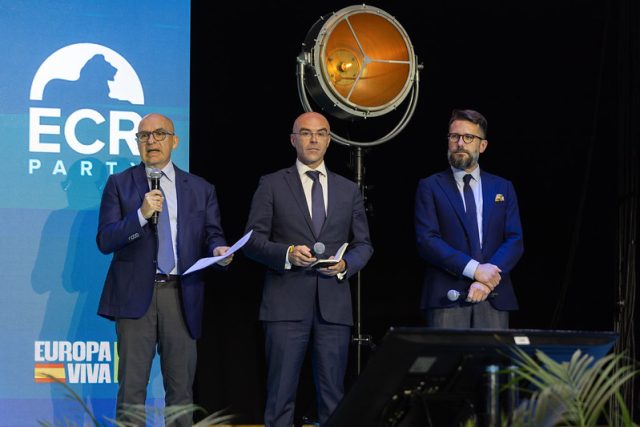
During ECR’s and VOX’s (Spain) “Europa VIVA 24” event in Madrid last weekend, the Party presented attendees with a Manifesto containing a series of commitments for the new legislative term, with a clear call to preserve “national identities.”
According to the text, “The ECR Party rejects the unnecessary centralization of power in Brussels, proposing that decisions be made as close to citizens as possible.”
The first and most fundamental point of the Manifesto “A European and Conservative future for Europe” focuses on the autonomy and sovereignty of European nations.
The advisor to Jarosław Kaczyński, Radosław Fogiel, explained in detail this foundational promise the ECR makes just weeks ahead of the upcoming European elections in June 9.
Fogiel emphasized that Europeans must preserve their national identities and safeguard the sovereignty of EU Member States.
“Without the nation-state we will not be able to have an organization like the European Union,” said Fogiel at the Vistalegre Palace in Madrid.
The sovereignty of European countries was one of the overarching themes of the three-day event, which saw speakers including Marine Le Pen, the President of the National Rally group in the National Assembly of the French Republic; the Italian Prime Minister, Giorgia Meloni; and the president of Argentina, Javier Milei.
Fogiel warned the audience about emerging threats to the sovereignty of Member States. According to the Polish MP, some politicians and bureaucrats would like to “change the treaties and create one single European state” that would transfer most decision-making from the European capitals to Brussels.
“There is no European demos,” he added.
The Manifesto also lays out its doctrine for immigration, one of the main themes of the convention, and one of the host countries must challenging issues. Like the Italian island of Lampedusa, the Spanish Canary Islands in the Atlantic, are one of the hotspots of the crisis, with thousands of undocumented people pouring in each month.
The Manifesto outlines a clear strategy for border patrolling focusing on building and bettering infrastructure to combat illegal entries to European soil.
“Europe cannot turn its back” to the immigration crisis that puts European citizens at the receiving end, said Carlos Fidanza, Member of the EU Parliament’s Bureau.
Fidanza explained that, moving forward, Europe must lead the world in devising a strategy against the cartels that foster illegal immigration, and focus on the Mediterranean—one of the hotspots of the migration crisis.
According to Fidanza, Europe must also develop a non-predatory investment policy for African countries that guarantees security and development.
On security, the ECR sees the Russian Federation as a major threat to European interests and calls for major investments from the public and private sectors in defence.
The Manifesto advocates for innovation in military technologies and larger cooperation among Member States. However, it rejects the creation of an EU-wide defence Union.
EP Vice president, the Latvian Roberts Zile explained that the North Atlantic Treaty Organization (NATO) is a fundamental guarantee to Europe’s security and said, “we need to fight against the fragmentation of armed forces.” Indeed, the Manifesto calls for larger EU-NATO cooperation.
The Manifesto also calls for a tougher political stance on revisionist countries like the People’s Republic of China and Iran and a broad strategy to protect religious freedom.
On agriculture and climate change, the Manifesto calls for a reform Common Agricultural Policy and a “balanced” climate strategy that “reviews” the targets of the European Green Deal.
Nuclear and geothermal energy are included in the Manifesto as means of ensuring European energy security. In this regard, the Manifesto also promotes “an favorauble regulatory environment for investment in advanced technologies,” which is set to be one of the cornerstones of a revitalised industrial policy.



 Subscribe
Subscribe